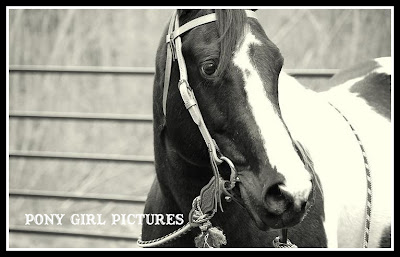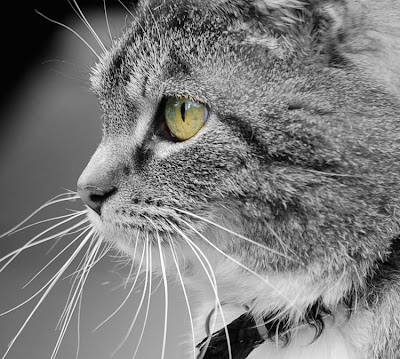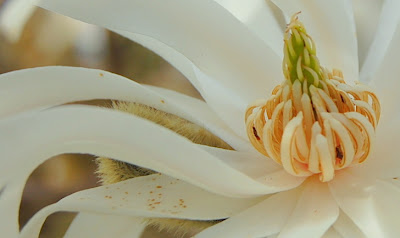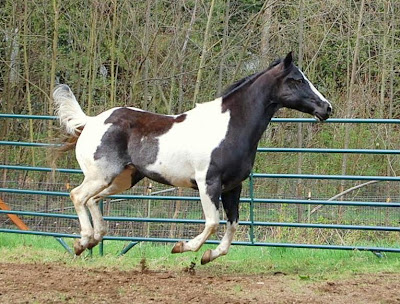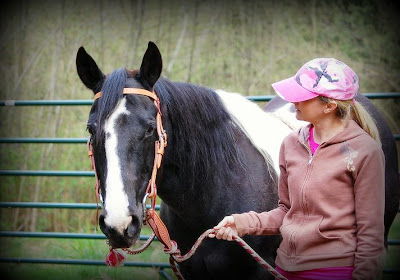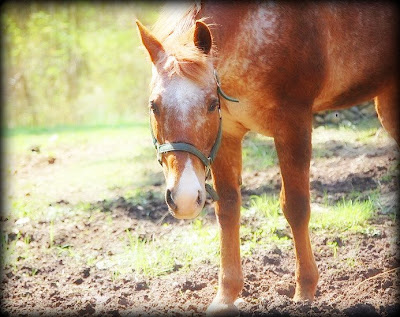 After I cooled My Boy out on Sunday, we stood in the shade and worked on some muzzle desensitizing.
After I cooled My Boy out on Sunday, we stood in the shade and worked on some muzzle desensitizing.You see, My Boy has a tendency to panic when you apply even the slightest pressure to his upper lip. We had a bit of a come-to-Jesus moment of head tossing and avoidance at first, then I had him settled down and we went to work. I would touch the upper lip with the flat of my palm. If he stood calmly for a few seconds, I removed my hand (and therefore the 'pressure.') After a minute, I'd try it again, only removing my hand when he wasn't moving his head.
Eventually, I got to where I could even apply a slight squeeze to the upper lip without him worrying something awful was about to happen. I didn't expect him to tolerate this for long periods of time at first. I was just pickin' battles if I did that. Instead, I rewarded small efforts. I think this was more successful.
 Yes, a few times a year, that pressure on the upper lip might mean a twitch is a-comin'. But I really need for him to not anticipate and fear that every touch to the lip means it's twitch time! I think if I work with him on this consistently, our future vet appointments might go a little easier.
Yes, a few times a year, that pressure on the upper lip might mean a twitch is a-comin'. But I really need for him to not anticipate and fear that every touch to the lip means it's twitch time! I think if I work with him on this consistently, our future vet appointments might go a little easier.I think my horse is great at anticipating the worst, at least in situations involving veterinarian care. A vet once commented to me, "Man, he has had it all done in his life, hasn't he?" She meant a shoulder twitch, an ear twitch, the chain over nose, the lip chain....you name it, someone has done it on him. Yep Dr. Equine, he sees you and your bag of tricks coming a mile away. It's unfortunate that these methods of restraint have to be used with him at all, but that is another issue altogether.
 I am the absolute furthest thing from an expert on horse training, but I do know that it is very easy to send the wrong signals to my horse and actually reward negative behavior. For example: I want to let my horse hand-graze and we're walking towards a lawn which hasn't been mowed in three weeks and it's looking juicy and green. And the minute we start walking onto that lawn he starts pulling on the lead rope or jerking his head or nudging me in anticipation of getting to that grass, and I let him get his head down to eat.....well then, I am actually reinforcing those bad behaviors. After all, they worked for him, right? They got him what he wanted.
I am the absolute furthest thing from an expert on horse training, but I do know that it is very easy to send the wrong signals to my horse and actually reward negative behavior. For example: I want to let my horse hand-graze and we're walking towards a lawn which hasn't been mowed in three weeks and it's looking juicy and green. And the minute we start walking onto that lawn he starts pulling on the lead rope or jerking his head or nudging me in anticipation of getting to that grass, and I let him get his head down to eat.....well then, I am actually reinforcing those bad behaviors. After all, they worked for him, right? They got him what he wanted.Rather, I make him stand quiet, no head tossing, and wait- for at least one to five minutes (it feels like forever to us both.) Once he is standing still and not "begging" with bad behavior, I lower my hand to the ground. He knows that is the "release" signal that he can begin grazing. In other words, it's my decision when he eats, not his. Otherwise, he'd be pulling me across the yard in pursuit of the green stuff the minute he could. Now, what I really need to add to this once in a while is to just walk him past that green grass and put him away, without any grazing at all. In the end, these small things might prevent the creation of a monster.
 It is common sense really, but sometimes difficult to remember in every moment with my horse. I don't think a good horse will be ruined by letting these little things slip once in a while, but I know that as a potential horse-spoiler, I personally have to make a conscious effort to think about all of my actions and reactions and how I might inadvertently be modifying my horse's behavior- in a bad way. I think what makes a really good trainer or horseman is that they are very in tune to a horse's behavior and how their reactions are rewarding the horse, for good or bad. It's second nature for them. I'm still in the stage of having to break it down into steps and thinking about it, but I'll get there.
It is common sense really, but sometimes difficult to remember in every moment with my horse. I don't think a good horse will be ruined by letting these little things slip once in a while, but I know that as a potential horse-spoiler, I personally have to make a conscious effort to think about all of my actions and reactions and how I might inadvertently be modifying my horse's behavior- in a bad way. I think what makes a really good trainer or horseman is that they are very in tune to a horse's behavior and how their reactions are rewarding the horse, for good or bad. It's second nature for them. I'm still in the stage of having to break it down into steps and thinking about it, but I'll get there.






























